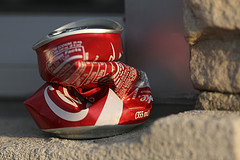Study: Sugary Beverages Have Tenuous Relationship Between Reality And Nutrition Info

(stirwise)
Adding fuel to the HFCS vs. sugar fire, a new study claims that not only does the actual amount of sugar in a sweetened beverage vary wildly from what the nutritional information says, but that drinks sweetened with High-Fructose Corn Syrup contain significantly more fructose than had been expected.
The study, published by the Childhood Obesity Center, tested 23 different sweetened beverages — from fountain sodas at McDonald’s and Burger King to canned tea and bottled apple juice — and found that the actual total sugar content of these drinks ranged anywhere from 85% to 128% of what the nutritional info states.
Fountain sodas were uniformly sweeter than the other drinks, with a Coke from McDonald’s containing 128% of the sugar it was supposed to. The least sugary fountain drink in the study was a Coke from Burger King, which contained around 117% the amount of sugar on the nutritional info.
On the low end of that test was the Kroger Apple Juice Cocktail, which only had 85% the amount of sugar on the label. Surprisingly, both Dr. Pepper (approx. 87%) and Mountain Dew (approx. 92%) made up the rest of the bottom three.
The other test done in the study was to determine just how much fructose is contained in these drinks. The standard combination in HFCS is somewhere between 42%-55% fructose, but this study found a mean of 59% fructose among the drinks researched.
Both Pepsi and Coke contained the highest amount of fructose, around 65%. Meanwhile that super-sweet fountain Coke from McDonald’s was just below the mean.
Says the study’s author:
The elevated fructose levels in the sodas most Americans drink are of particular concern because of the negative effects fructose has on the body… Unlike glucose (the smaller component of HFCS), over consumption of fructose is directly responsible for a broad spectrum of negative health effects.
Of particular interest are the results of the tests on Mexican Coke, which showed virtually no sucrose, but equal parts glucose and fructose. Researchers believe this suggests that HFCS, which is not mentioned on the bottle’s label, was used to sweeten the Coke.
Check out the PDF of the study here.
Soda’s Sweetened with HFCS Deliver Unexpected Jolt of Unhealthy Fructose [Press Release PDF]
Want more consumer news? Visit our parent organization, Consumer Reports, for the latest on scams, recalls, and other consumer issues.

